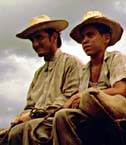
Movie Guru Rating:

Comment
on this review
| |

Before Night Falls makes life out of art.
by Jesse Fox Mayshark
Before Night Falls couldn't be more of an "art film" if it came with a gilded frame. A movie directed by a celebrated painter about a tormented but equally celebrated writer, with guest spots by Johnny Depp and Sean Penn and music by Lou Reed and Laurie Anderson, it oozes hip high-mindedness from every beautifully constructed scene.
It"s good, too. A little long, maybe, and periodically incoherent, but mostly engaging and lyrical and dramatically punchy. The best moments transcend the obvious pretensions of the whole project in dreamy or nightmarish bursts of raw emotional experience.
It was adapted from the autobiography of gay Cuban novelist Reinaldo Arenas, who fled his homeland after spending time in prison in the 1970s. The director is Julian Schnabel, a ballyhooed SoHo painter who made his first venture into filmmaking with another artist biopic, 1996's Basquiat. That movie looked good, but it fetishized its subject more than it illuminated him. And since Schnabel was friends with Jean-Michel Basquiat and based a character in the film on himself, it was hard to avoid feeling the presence of a monstrous directorial ego.
Recent interviews I've read with Schnabel suggest his ego is still plenty healthy (and all the "Best of 2000" awards heaped on Before Night Falls certainly won't do much to deflate it). But this time, he immerses himself in a foreign world, the Cuba of Arenas' childhood and early adulthood, and takes his cues from his subject rather than the other way around.
Arenas is a compelling figure, especially as brought to life by the muscular Spanish actor Javier Bardem (previously seen in Jamon Jamon and Pedro Almodovar's Live Flesh). Bardem manages the difficult (and for many actors insurmountable) trick of letting us see far enough into Arenas' heart and head to convince us he could write the dazzling, poetic texts we hear scattered throughout the film. The movie also has a complex take on his sexuality. Arenas was apparently a voracious lover, claiming to have slept with 5,000 men by the time he was 25, but Bardem and Schnabel suggest layers of motive for his promiscuity: fear of abandonment, an endless search for his absent father, a knee-jerk rebellion against convention.
Apart from Bardem's performance, the film's most admirable quality is also its most frustrating—a narrative approach that skips and skitters across Arenas' story, giving us selected moments in brilliant depth and detail, but rarely connecting the dots. When it works (and as a whole, it does), it's an effective reinterpretation of the themes evoked by Arenas' life and work: art and sex as acts of subversion, the betrayal of revolutions, the difference between personal and political freedom.
But the details of any given section can be confusing; characters appear, disappear, and reappear with only vague allusions to the events that have transpired in the meantime. That could be the result of awkward editing, but I think it's intentional—Schnabel wants to show us the key moments, the turning points, and let us fill in whatever's missing. Sometimes, that's OK; other times, you wonder what the hell is going on.
Most of the cast is strong, particularly Olivier Martinez and Andrea Di Stefano as Arenas' two most prominent lovers. Johnny Depp's two brief appearances—first as a transvestite with remarkable but unprintable talents and second as an icily homoerotic military inquisitor—give more precise characterization in a few minutes than he often manages in an entire movie.
Over all of it, of course, looms Schnabel. It's too easy to say he films like he paints; he has yet to settle into a cinematic style as identifiable as his madly controlled paintings, with their violent brushwork and tension between order and chaos. He's still playing with the tools of film, and if Before Night Falls is marked by anything, it's visual excess. Crane shots, dolly shots, hand-held mock-documentary, washed-out historical footage—if Schnabel could get his hands on it, he used it. But you can't deny either his eye or his imagination. There is a wordless scene involving a hot air balloon and an abandoned church that is as heartfelt and poetic a metaphor as anything in the Arenas selections we hear. Likewise, a prison for criminals and deviants looks and feels like a circle of hell.
Schnabel wisely abbreviates Arenas' last decade, when he lived as an exile in Manhattan. (The shift from the accented English spoken during the Cuban portion to the Spanish spoken in New York is an effective way of reinforcing his alienation as a "stateless person.") All of the writer's life and art was defined by his embrace of and rejection by his native country. He died in New York of AIDS; his memoir, published to wide acclaim in 1992, was a posthumous homecoming. And Schnabel's rambling but rousing movie is a celebration of art's ability to cross the boundaries of place, class, culture, politics, and even death. It's an "art film" that does well by both of those words.

February 8, 2001 * Vol. 11, No. 6
© 2000 Metro Pulse
|